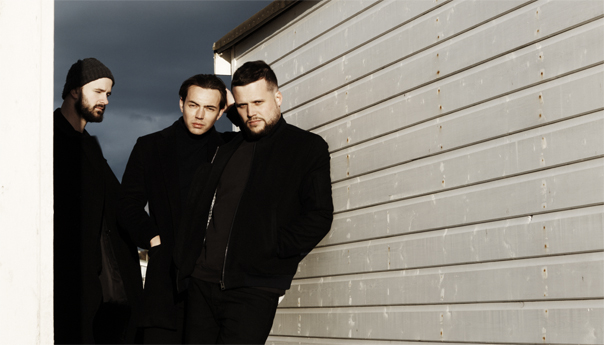White Lies return with signature choruses, new Friends

U.K. rockers White Lies have always had a way with big arm-waving choruses. You can hear them coming from a mile away. And with the band’s return following three years away, a self-produced fourth album on a new label—Friends—their hallmark remains.
White Lies, VOWWS
9 p.m., Tuesday, Feb. 14
The Chapel
Tickets: $25-$30.
But the musical signature works so well with Harry McVeigh’s deep Ian Curtis-like vocals. When the chorus hits, you’re swept up from the depths in that euphoric swell of its weighty embrace. And yet, McVeigh, Charles Cave and Jack Lawrence-Brown are still having to deal with the expectations of how they should sound.
The trio took its moniker almost 10 years ago; a play on the true dark undercurrents in their sound. “White lies are dark,” and that’s how they see themselves, McVeigh said from his new home in San Francisco, to which he recently moved. “[But] at the time, we chose the name ’cause it sounded cool.”
The band was always bemused when critics labeled their music “gothic,” and expected songs to reach for an existential depth for which they weren’t necessarily aspiring, then slammed them for not being deep enough.
“We have never really felt unsure of ourselves,” McVeigh said. “We know how to be true to White Lies and incorporating elements that are very White Lies. I stay away from what is written about us because I think it is unhealthy to think about what people are going to write about you before you write it.”
On Friends, the band functions best when it gives in to the grandiosity of its ’80s sound without attempting gravitas, like on the uplifting synth strands of “Morning in LA.” They even wander into disco on “Is My Love Enough?”
Classic White Lies tracks like “Hold Back My Love” and “Take It Out on Me” are drum-led, driving rock-and-synth anthems in the vein of Joy Division and The Killers. They capture the vitality of one of their best tracks, “There Goes Our Love Again,” from 2013’s Big TV.
“Growing up, we were big fans of REO Speedwagon,” McVeigh said. “We’ve always toed that line between cheesy and not cheesy. To that end, we also like Steely Dan. Both bands have a great sound that we enjoy. We try not to take ourselves too seriously.”
REO Speedwagon, for all their sappy ’80s lyrics, implanted great melodies in rock ballads like “Can’t Fight This Feeling” and “In My Dreams.”
“Their music is filled with great melodies, and that is something that we’ve always strived for,” McVeigh said.
Recording at Bryan Ferry’s London studio, White Lies used a haul of vintage synthesizers to achieve the REO Speedwagon-inspired sound that their engineer said they should scrap. The band decided to keep it, but use it sparingly.
“The main thing about going to record in a studio like that is it’s equipped with instruments that the person who owns it likes to use,” McVeigh said. “In our case it was Bryan Ferry, and there were a lot of synthesizers.”
Roxy Music keyboardist Brian Eno pushed the boundaries of synthesizers. White Lies had access to some interesting vintage synthesizers like the Prophet 5.
“Don’t Fall” in particular has a quieter edge to it. It begins with Eno-esque alien keys and has a paced melody different than anything else on the album or their back catalog. Themes of growing older, getting married and departing a familiar life also fall into place well with the staccato rhythm.
The studio also had its drawbacks, but the band used that as an opportunity to create something different.
“The live room was not huge. When we record drums, especially, we like that hard, big roomy sound [that] you would expect from a rock band, like on our previous records,” he said. “Here, the drums had to be tight and dry, which lends itself to a slightly different sound on this record. We wouldn’t have had this at another studio.”
Follow Celine Teo-Blockey at Twitter.com/CelineT_Blockey and Instagram.com/celineteoblockey.
